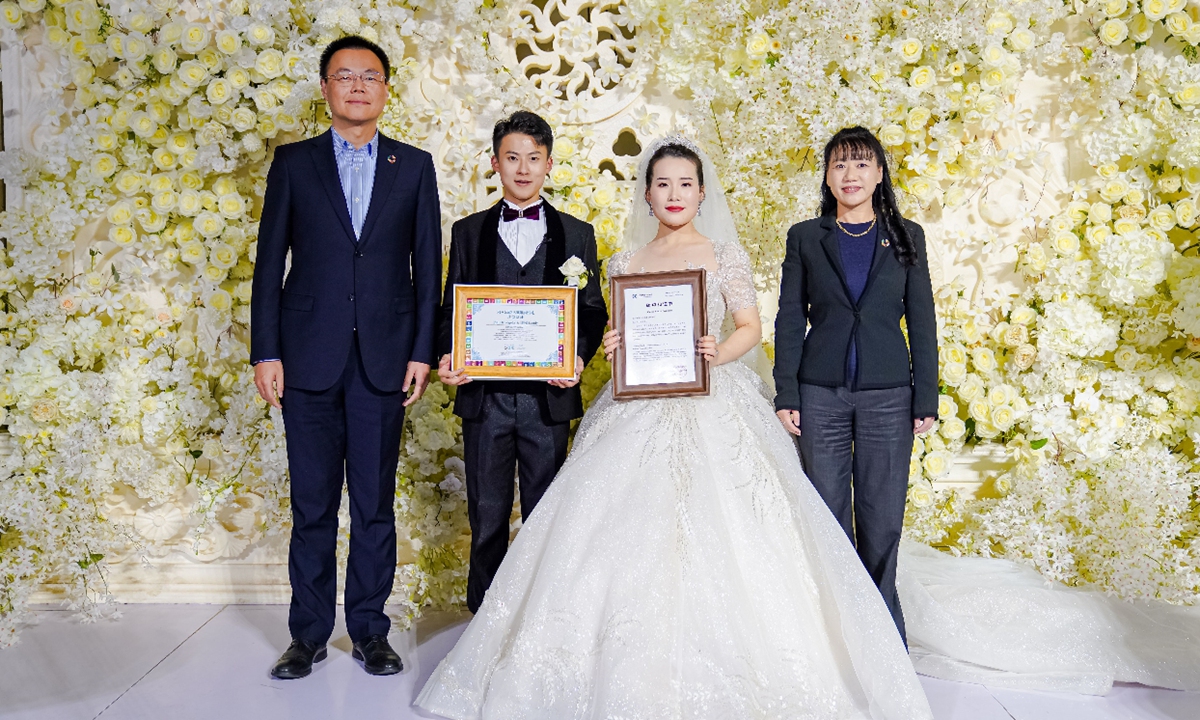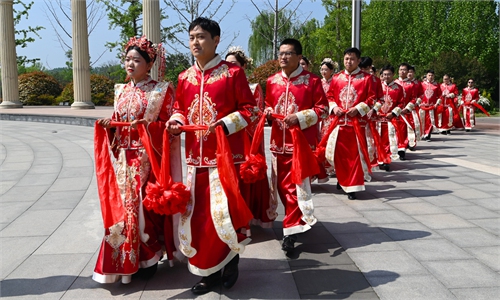ARTS / CULTURE & LEISURE
Young couples practice environmental protection via carbon neutral weddings
Reducing footprints

The Vegeta couple poses with carbon neutrality certificates. Photo: Courtesy of Vegeta
Yang Yin held her wedding ceremony in Shanghai during the just past National Day holidays, a traditional wedding peak in China. The wedding, in her words, "couldn't be simpler, environmentally-friendly and low-cost."Yang only invited some 20 guests, all of which were her and her husband's close relatives. They dined at a hotel, with neither a wedding host nor cameraman present. The new couple wore ordinary hoodies rather than formal dresses.
"And we took a bus to the hotel," Yang told the Global Times.
Unlike the elder generation who like grand, lively and even extravagant weddings, now many young Chinese people prefer small-sized and eco-friendly ones.
Even more noteworthy is the growing popularity of "carbon neutral weddings" among young couples, who decorate the wedding venues with recyclable materials, offer the guests vegetarian or vegan dishes, and purchase the carbon emissions their weddings produced. These pioneers of environmental protection try hard to promote the idea of a low-carbon lifestyle at their most important moments in life.

The Zhong couple and guests at the wedding Photo: Courtesy of Zhong Hao
A meaningful attemptZhong Hao, 27, spent two months preparing for his special "carbon neutral wedding" being held in Shanghai. He bought carbon offsets made by the wedding to achieve its carbon neutrality.
Zhong shared with the Global Times some other low-carbon highlights of his wedding. Those included using second-hand wedding necessities, choosing new-energy vehicles (NEVs) as wedding cars, recommending out-of-town guests travel by high-speed rail, and replacing some of the meat dishes of the wedding banquet with vegetable ones.
Engaging in environment protection industry himself, Zhong said the wedding was a meaningful attempt to him. "It was a special ceremony, at which I could share my low-carbon and eco-friendly lifestyle," he said.
Similarly, vegan and rapper Zhang Renhuan, who prefers to go by the name of "Vegeta," also held a carbon neutral wedding in a public park in Shanghai suburb.
All the dishes, snacks and drinks offered at the wedding were animal-free, said Vegeta. "My wife and I wanted to show my friends and relatives what a 100-percent vegan wedding is like," he said. "We believe that a [moderate vegetarian] diet is in line with a low-carbon and healthy lifestyle."
Apart from vegan food, Vegeta and his wife experimented with several ways to make their wedding to meet the eco-friendly "5R" principle: refuse, reduce, reuse, repurpose, and recycle. "There were no fireworks at our wedding, and we made many parts of the ceremony - like [pre-wedding] photo showcase and the lucky draw - as paperless as possible," Vegeta told the Global Times, adding that the wedding was held in accordance with the 2030 Sustainable Development Goals (SDGs) the United Nations adopted.
"It was not only the time of my life, but [an occasion] that I could do something to contribute to our community."
'It's worth it'
China has set the target of peak carbon dioxide emissions before 2030 and will achieve carbon neutrality before 2060.
To environmentalists like Vegeta and Zhong, a truly "carbon natural wedding" involves accounting for and purchasing the wedding's carbon footprint, which are lesser-known notions to the general public at present.
Ahead of their wedding, Vegeta and his wife reported the ceremony information to a related third-party agency, which included details such as the travel methods of their guests, as well as the quantity, weight and raw materials of the food. The agency calculated the carbon dioxide emissions generated by Vegeta's wedding equivalent to three tons, significantly under the "62 tons" that an "average wedding party in the US" reportedly produces.
Vegeta and his wife bought the three tons of carbon offsets as a way to achieve carbon neutrality for their wedding. The money they cost is used in an eco-friendly farming biogas project in South China's Guangxi Zhuang Autonomous Region, according to a carbon neutrality certificate that Shanghai Environment and Energy Exchange issued to them.
The Zhong couple also bought five tons of carbon offsets that their wedding produced. Before that, it had submitted six excel forms of wedding details to the carbon emission calculation agency.
The calculation and purchasing of carbon emissions is a somewhat complex work that makes wedding preparations more tiring. "But it's worth it," Zhong told the Global Times. "Through calculation, I clearly knew how many carbon dioxide emissions my wedding generated, and that made the concept 'low-carbon' no longer ambiguous, abstract to me."
New-style weddings
The growing popularity of simple, low-carbon wedding ceremonies in recent years reflects the increased awareness of environmental protection among young Chinese, said sociologist and educationalist Hua Hua, an associate research fellow at the Shanghai Academy of Social Sciences.
It also shows that the "new-era" marriage and childbearing culture that Chinese government advocates for, which opposes extravagant wedding ceremonies, is gaining ground, Hua told the Global Times.
Starting from last year, China rolled out a pilot project across the country with the aim to promote marriage and childbearing at appropriate ages, improving prenatal and postnatal care services, encouraging couples to share child-rearing responsibilities, and curbing the high costs of betrothal gifts and other outdated marriage customs.
As a ritual witnessing two people form a new family, wedding's form could have been varied, Hua said. "It's good to see the broad-sighted young generation adopting a new-style wedding, which both reflect their personalities and follow the ideas of low-carbon and living with one's means promoted by the country."




